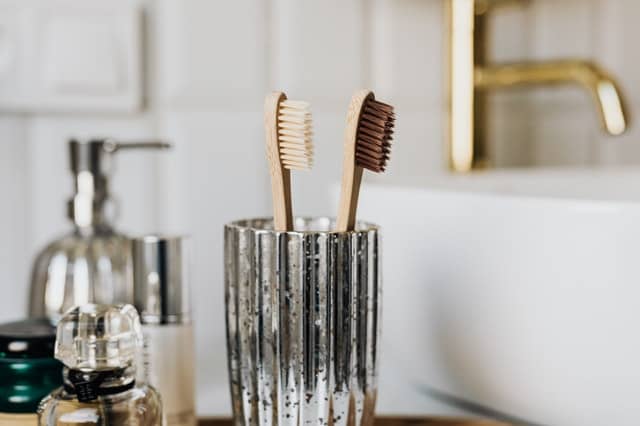
Everything you want to know about bamboo toothbrushes
Bamboo toothbrushes are rising in popularity nowadays, and we couldn’t be happier! Toothbrushes made out of bamboo are sustainable alternatives to conventional plastic because they are all-natural, organic, recyclable, and come from a renewable source.
This biodegradable alternative with its bamboo handle and nylon bristles is just as strong as your normal toothbrush, with an added bonus of knowing you’re helping the environment while reducing your carbon footprint.
Like any other plastic, its widely known plastic toothbrushes contribute to our global waste problem. The environmentally unfriendly material has contributed to a disposable lifestyle where we ignore the end results.
In fact, 50% of plastic is used just once and thrown away–to our environment’s despair.
Aside from being fully biodegradable, bamboo is also a sustainable and renewable source. It’s a fast-growing tree that is disease-resistant while requiring no chemicals to grow.
Crazily enough, some bamboo varieties can grow over 4 feet in just 1 day!
No need to worry about stealing food from pandas either. The type of bamboo used to produce most toothbrushes isn’t the type of bamboo that pandas eat.
If you want to try this, one tip is to carefully break the handle into smaller pieces, then bury it a few inches deep into warm and wet soil or composter. This will aid the process of decomposition, and it’s also pretty easy, requiring little effort on your part.
Home-composting would probably take around 6 months to break down your toothbrushes.
If you’re super eco and have access to an industrial composter, it can take just a few weeks.
Remove the bristles and staples carefully using pliers. Afterward, you can proceed to recycle it.
The staples are usually aluminum and most recycling services will recycle them, so you can leave them in your recycling bin for pickup. Do note that while these systems can probably filter through the smallest of metals, it is still better to collect the tiny bits of aluminum and wrap them in foil or a labeled bag to keep them from getting separated.
The bristles are usually made from nylon, which can also be recycled by collection services. While each nylon bristle is quite small and not enough to be recycled on its own, nylon bristles easily bunch up together.
One tip is to find a small plastic container, collect all the nylon bristles and put them in the container for easy handling.
As for the bamboo handle, there are numerous ways to recycle them. You can place them in your compost like mentioned above, or you can use them for your D-I-Y projects and decorations.
If you’re into gardening, you can even make them into natural plant labels. Lastly, you can also throw them into the woodpile if you have a fireplace or firepit.
Once the sugar evaporates upon sterilization, the bamboo will become a bit darker. It will then be left to dry.
The dried bamboo pieces will be sent to another facility where they are shaped and cut into equal toothbrush lengths, polished, and usually sent to another facility.
This final facility will be in charge of tufting the bristles (soft or medium) without any glue, ensuring the product is as sustainable as can be!
Although boar hair is a more sustainable replacement for nylon bristles, it’s not great for your teeth. Boar hair is rougher than nylon bristles, and it can really wear out your enamel and contribute to receding gums. Choose carefully.
It is also safe for the environment since using a bamboo toothbrush will significantly decrease your carbon footprint contribution. This is especially true if you dispose of it responsibly.
Like any other toothbrush, make sure to choose the make of your bamboo toothbrush correctly. Take into consideration the size of the toothbrush head, the size of the narrowest areas of your mouth, how comfortable the handle is, and whether you like medium or soft bristles.
Don’t apply too much pressure when brushing your teeth either, since this can cause damage to your teeth. Brush just like you would when using a plastic toothbrush.
Since bamboo is a natural, organic, and porous material, your bamboo toothbrush can catch fungus and mold pretty quickly if left in a moist environment.
If you don’t dry out your toothbrush correctly, water can pool at the bottom of your toothbrush holder and penetrate into the handle, lessening the life of your bamboo toothbrush.
This does not affect the sustainability and eco-friendliness of the toothbrush, since charcoal is also a natural ingredient.
Charcoal is infused into the bristles because they have natural antibacterial, antifungal, and antiviral properties. These properties help fight tooth decay, gum diseases, and plaque build-up. Charcoal can also whiten your teeth if they are stained by coffee, cigarettes, or certain foods.
As you can see, there really is nothing better a conventional toothbrush can do over a bamboo toothbrush.
The added benefits of using a fully biodegradable product also feels good because you know you’re helping the environment and living a sustainable life!
For information on other eco-friendly bamboo products, check out our bamboo straws FAQ and our bamboo pillows FAQ.
